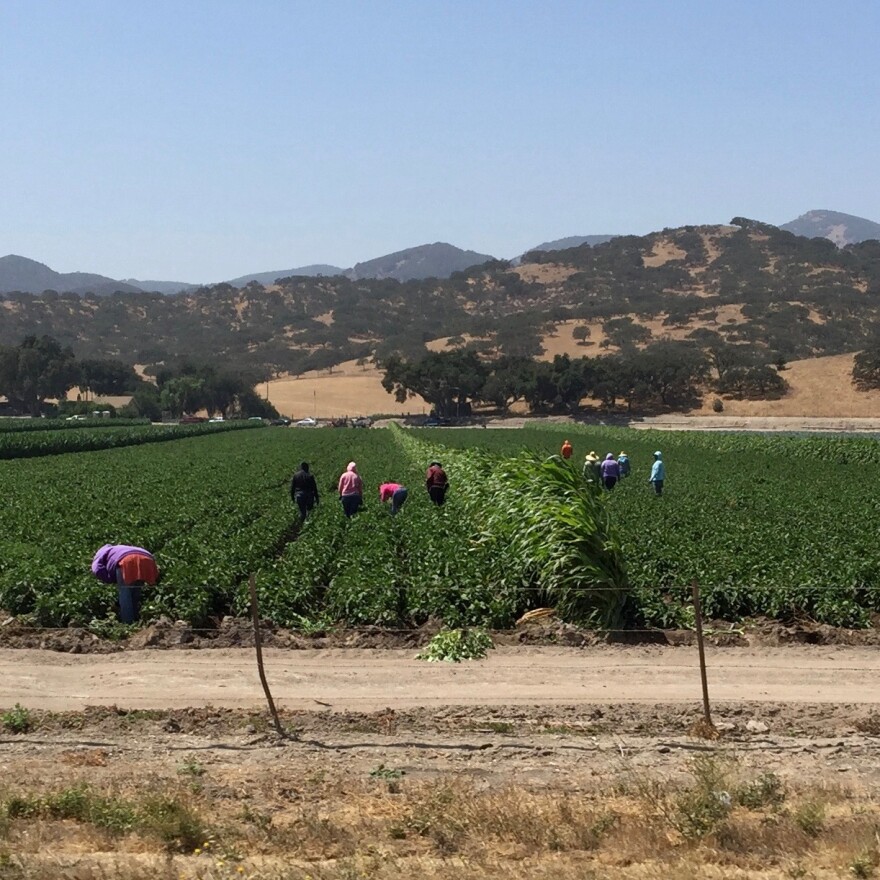New reporting from the non-profit news outlet CalMatters explores a new farmworker study from UC Merced. The study reveals that California farmworkers are living and working in difficult conditions. It surveyed over 1200 farmworkers in six languages about their health, mental health, access to health care and work conditions.
KCBX’s Gabriela Fernandez spoke with CalMatters’ Central Valley Reporter Nicole Foy about her reporting.
—
Fernandez: This study outlines the living and working conditions of farmworkers across the state. What were the main outcomes?
Foy: One of the main things that I want to point out before we kind of dive into the breakdowns of what the survey found is, when they talk about the health of a farmworkers — and the health of the folks who are who are growing our nation's food really — they're not just talking about whether they have access to a doctor or when they were last screened for cancer. They also really looked at general mental well-being, and access to health care, as well as the things that are kind of known as social determinants for general health and well-being. Such as workplace conditions, knowledge of labor rights under state and federal laws, [and] housing conditions. So I think it gives a much more comprehensive look at all of the issues that come together to show the general health and well-being of what is one of the most under-resourced and vulnerable workforces in the state.
Fernandez: All the farmworkers analyzed from the Central Valley? And, are they facing the same burdens as farmworkers here?
Foy: So the farmworkers that the UC Merced Center surveyed were from across the state. The largest numbers were from the Central Valley because that is where the largest proportion of the state’s workers are, but [there’s] also significant numbers of farmworkers along the Central Coast. They also surveyed a number of farmworkers in the Imperial, and Coachella Valleys, also in the Napa and Sonoma area. The center has this really cool — I would encourage anyone to go and look at the website where they've released the report. They have this tool that you can kind of track and see different areas of the state and where they surveyed some of these farmworkers because different different parts of the state are going to struggle with different things. Housing costs are probably going to be more expensive in areas like the Central Coast then maybe areas in the Central Valley.
Fernandez: What does this say about how farmworkers are treated?
Foy: One data point that I think that was really emphasized by the study authors was that 36% of farmworkers surveyed said they would be unwilling to file a report against their employer for non-compliance with workplace health and safety rules, and 64% of those workers who said that said [it was] because they would be afraid of retaliation or of losing their job if they did so. I think that's something that many state agency leaders who were at the studies launch on Friday said was a very concerning statistic to them, and one that they really want to actively work towards addressing, whether through community outreach or working with employer education as well.

But also, you know, being unable to speak up against an employer can lead to a number of health issues. Another statistic that was really shocking or disturbing for a lot of people was saying that 43% of farmworkers said that their employers never provided them written heat illness prevention plans, which is something that's mandated by Cal/OSHA. That's really concerning considering that our summers don't seem to be getting any cooler anytime soon.
So those are all things that the state has rules against, but because of the low annual income available to farmworkers, a shaky work authorization status, and language barriers — [they] can make it really difficult for for these workers to secure better conditions for themselves. So that's something that is definitely affecting the overall health of this workforce and it's something that I think the study authors really wanted to point to as something that State leaders should pay attention to.
Fernandez: What are the factors behind these conditions?
Foy: I think just what's been in the news so much with the horrible housing conditions that were uncovered after the mass shooting at the farms in Half Moon Bay kind of shows that it does seem to be a mix of things. You know, there's questions about what was the county and state oversight there and also questions about what were the responsibility of the farm owners and where that property was built. So I think particular advocates might have stronger opinions on who's responsible here, but I do think the studies authors do make a pretty pointed case for the widespread issues that farmworkers reported. Whether it was workplace issues or housing conditions kind of make a case for the state to invest a lot more time and intention and possibly policy changes that could help support this workforce.
This interview has been edited for length and clarity.



